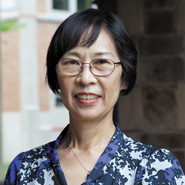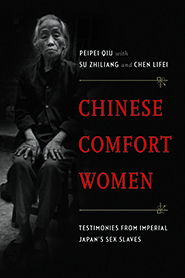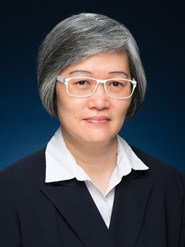Chinese Comfort Women:
Testimonies from Imperial Japan's Sex Slaves
|
Speaker: |
Professor Peipei Qiu 丘培培 (Vassar College, USA) |
|
Moderator: |
Professor Clara Wing-chung Ho 劉詠聰 (Hong Kong Baptist University) |
|
Date: |
19 October 2017 (Thursday) |
|
Time: |
6:30 - 8:00 pm |
|
Venue: |
Special Collections, 1/F, Main Library, The University of Hong Kong |
|
Language: |
English |
Click here to re-visit the book talk Chinese Comfort Women
About the Speaker
|
|
Peipei Qiu is The Louise Boyd Dale and Alfred Lichtenstein Chair Professor of Chinese and Japanese, and Chair of the Department of Chinese and Japanese, Vassar College, USA. Qiu is the recipient of a number of honors and grants, including a Chinese American Librarians Association Best Book Award, National Endowment for the Humanities Fellowship, The Japan Society for the Promotion of Science Fellowship, Columbia University President’s Fellowship, and The Japan Foundation Fellowships. She is the author of Bashô and the Dao: The Zhuangzi and the Transformation of Haikai (Hawaii University Press, 2005), Chinese Comfort Women: Testimonies from Imperial Japan’s Sex Slaves (with collaborating researchers Su Zhiliang and Chen Lifei, University of British Columbia Press, 2013; Oxford University Press, 2014; Hong Kong University Press, 2014), and many research articles in English, Japanese, and Chinese.
|
About the Book
|
|
During the Asia-Pacific War, the Japanese military forced hundreds of thousands of women across Asia into "comfort stations" where they were repeatedly raped and tortured. Japanese imperial forces claimed they recruited women to join these stations in order to prevent the mass rape of local women and the spread of venereal disease among soldiers. In reality, these women were kidnapped and coerced into sexual slavery. Comfort stations institutionalized rape, and these "comfort women" were subjected to atrocities that have only recently become the subject of international debate. Chinese Comfort Women: Testimonies from Imperial Japan's Sex Slaves was first published by University of British Columbia Press in 2013. In July 2014, Oxford University Press and Hong Kong University Press released its paperback edition in the USA and Asia respectively. The book consists of three parts. Part 1 traces the establishment of the military comfort women system in China from the early stages of Japan’s aggression in Manchuria and Shanghai (1932) to its rapid expansion after the Nanjing Massacre (1937), to Japan’s defeat (1945). It brings to light several previously hidden aspects of the comfort women system: the ransoms that the occupation army forced the victims' families to pay, the various types of improvised comfort stations set up by small military units throughout the battle zones and occupied regions, and the sheer scope of the military sexual slavery--much larger than previously assumed. Part 2 features the personal narratives of twelve women forced into sexual slavery when the Japanese military occupied their hometowns. Beginning with their prewar lives and continuing through their enslavement to their postwar struggles for justice, these interviews also reveal that the prolonged suffering of the comfort station survivors was not limited to wartime atrocities but was rather a lifelong condition resulting from various social, political, and cultural factors. Part 3 documents the survivors’ postwar lives and the “comfort women” redress movement in China. The personal narratives of these survivors combined with the testimonies of witnesses, investigative reports, and local histories reveal clearly a correlation between the proliferation of the comfort stations and the progression of Japan's military offensive. The first English-language account of its kind, Chinese Comfort Women exposes the full extent of the injustices suffered by women forced into sexual servitude by the Japanese military in Mainland China and the conditions that caused them. The book was named a Best Book of the Year by the Chinese American Librarians Association in 2014. The Chinese edition of the book (日本帝國的性奴隸:中國「慰安婦」的證言) was also published by Hong Kong University Press in July 2017.
Reviews: “Chinese Comfort Women, by Peipei Qiu, a professor at Vassar College, and two China-based co-authors, Su Zhiliang and Chen Lifei, sheds new light on this tragedy with heartbreaking profiles of 12 Chinese comfort women.”—Wall Street Journal “Chinese Comfort Women is significant in several ways. It provides the first English-language testimony, from twelve ordinary Chinese women, about the sexual enslavement of Chinese women during the war . . . Finally the book asks why these women did not receive justice under either socialist or neoliberal China in the years following the war. Highlighting the brutality of Japanese rapists, the book links Chinese patriarchal institutions and Japanese military masculinity. Examining the connection can help us to understand how and why women were treated as commodities: sold, bought, and tortured at the hands of both Chinese and Japanese men.”—Women's Review of Books “[Qiu, Zhiliang, and Lifei] carefully explain the complexity of the story in a nuanced and sensitive way . . . The nature of the subject makes this groundbreaking scholarly account of interest to informed laypersons seeking to learn about military history, World War II, and the sexual exploitation of women.”—Library Journal “The keen attention the authors paid to the notion of gender and sexuality in wartime and postwar Chinese sociopolitical systems makes this book not only and interrogation of war crimes committed by Japanese troops but also a critical reflection on the injustice to women perpetuated by local patriarchal society and masculine-nationalist history writing. This well-researched, well-structured book is indispensable for teaching modern East Asian history and politics and for rethinking organized violence.”—CHOICE |
About the Moderator
|
|
Clara Wing-chung Ho is Head and Professor of the Department of History, and Co-chair of Gender Studies Concentration, at Hong Kong Baptist University. |




